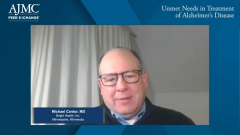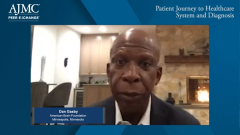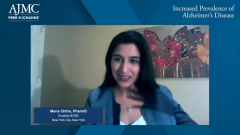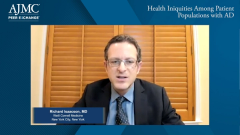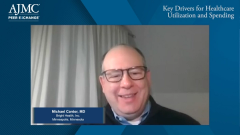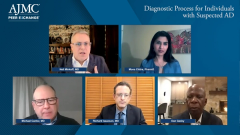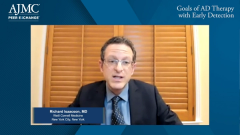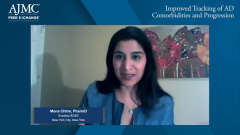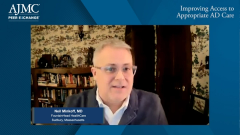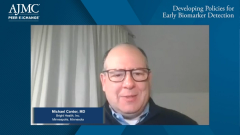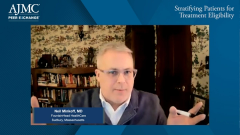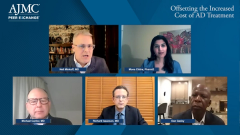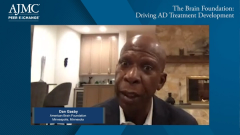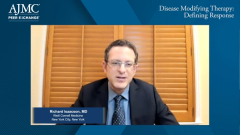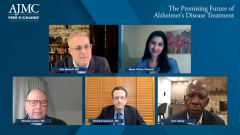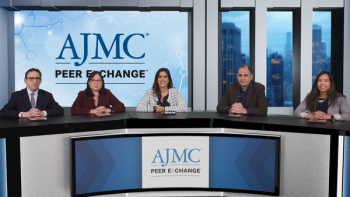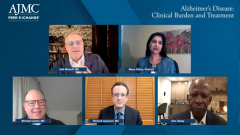
Alzheimer Disease: Clinical Burden and Treatment
Key opinion leaders discuss the clinical burden for a patient with Alzheimer disease and enumerate available drug and nondrug treatment options.
Episodes in this series

Neil Minkoff, MD: Hello, and welcome to this AJMC® program titled, “Reducing Alzheimer Disease Burden Through Early Diagnosis and Treatment.”
I am Dr Neil Minkoff, the chief medical officer of Coeus Consulting Group. Joining me in this discussion are some of my colleagues: Mona Chitre, PharmD, who is the chief pharmacy officer and the VP [vice president] of clinical strategy and innovation at Excellus BlueCross BlueShield; Dr Michael Cantor, who is the chief medical officer of Bright Health Plan; Dr Richard Isaacson, who is the director of the Alzheimer’s Prevention Clinic at Weill Cornell Medicine; and Dan Gasby, who is a board member of the American Brain Foundation.
Today our panel of experts will highlight the burden of Alzheimer disease and the unmet needs related to diagnosis and treatment, as well as clinical and payer considerations for the diagnosis and management of Alzheimer disease, to generate some discussion around future direction in diagnosis and eventual treatment of Alzheimer disease.
With that, I would like to begin. Dr Isaacson, maybe you can set the stage and start by discussing what the overall clinical burden is for a patient with Alzheimer disease and what the drug and nondrug therapeutic options are.
Richard Isaacson, MD: Alzheimer disease is a devastating disease. We will be talking about this throughout the evening on the panel. Dan, you have lived this: You are a hero for being a caregiver through this terrible illness. I have 4 family members with Alzheimer disease, so I saw this when I was little.
Alzheimer disease is a brain disease. It is a progressive neurological disorder that robs us of who we are. It takes away our memories, and it takes away our abilities to care for ourselves. It can cause psychiatric issues and sleep disturbances.
The take-home point with Alzheimer disease is this: It is not something that starts when a person has dementia. In medical school, about 20 years ago, I was taught that Alzheimer disease or dementia was a condition that happened when people got older, because that was our understanding at the time. As we are realizing, things are a little different now. We have biomarkers, and the biomarker is something we can look in the brain, in the spinal fluid, or even in the blood to show us that something is going on before symptoms take hold. Alzheimer disease begins in the brain over 20 to 30 years before the first symptom of memory loss begins. I believe passionately that, if we can identify the disease earlier, then we can hopefully do something about it either before symptoms or even when the symptoms are mild before a person is in the category of dementia.
Neil Minkoff, MD: Please, go ahead.
Richard Isaacson, MD: When it comes to the drug and nondrug approaches, when I think about drugs, I think about the pharmacological approaches. There are 4 FDA-approved drugs indicated for the dementia phase of Alzheimer disease. There are cholinesterase inhibitors, which are drugs like donepezil, rivastigmine, and galantamine. These drugs try to boost the memory chemical in the brain, and they have modest effects. They are not perfect, but based on over 100 evidence-based trials, these drugs do help somewhat. They are not miracle drugs, and they have only modest benefits.
There is another drug called memantine, which has a different mechanism called an NMDA antagonist, and that is FDA approved for combination therapy with donepezil or 1 of the other cholinesterase inhibitor drugs for the moderate to severe phases of Alzheimer disease dementia. It is not a miracle drug, but it has modest effects. I am using them combined in my clinical practice, and I believe that should be the gold standard. That being said, for fair balance of course, there are sometimes issues with adverse effects. The cholinesterase inhibitors can cause GI [gastrointestinal] disturbances, like stomach complaints. The NMDA antagonist, for example, may cause some confusion occasionally, and there may be some other adverse effects, but the take-home point is that we start low, we go slow, and we do the best we can.
When it comes to nonpharmacological approaches, there is a lot that we can do, and the evidence has exploded over the years. There are new data: the 2020 Lancet Commission report shows that 4 of 10 cases of Alzheimer disease may be preventable if that person does everything right in terms of exercising, living a healthy lifestyle with nutrition, and modifying their blood pressure control to a tight level. There are a variety of things. However, in 6 of 10 cases, even if that person does everything right, they are still going to get the disease, so we still have a ways to go. Overall, there are some things we can do, but some of the exciting therapies that are hopefully coming out in the future give me a lot of hope that we can make a bigger dent in the treatment of Alzheimer disease.
Neil Minkoff, MD: One of the questions I wanted to make sure that we were bringing out is this: As you were talking about that span of the 20 to 30 years before symptoms may emerge, how do you think prognosis could change based on early detection?
Richard Isaacson, MD: The earlier we diagnose from a clinical perspective, the earlier we can treat. The earlier you can treat, the better the patient should do. That makes sense. When a person already has dementia, the disease is built up in the brain—the amyloid, the tau—those are the pathologic proteins. The bad stuff that gets gunked up in the brain of a person with Alzheimer disease. When we can treat earlier before the amyloid is throughout the brain and before the tau and the neuroinflammation has taken hold, we have a greater chance of success.
The other thing is that there are lifestyle interventions that are being studied more. It seems that we can use some of these interventions earlier, even blood pressure control, for example. When we do all these different things together as early as possible, then early detection has to be the way we approach Alzheimer disease in the future.
Transcript edited for clarity.
Newsletter
Stay ahead of policy, cost, and value—subscribe to AJMC for expert insights at the intersection of clinical care and health economics.
